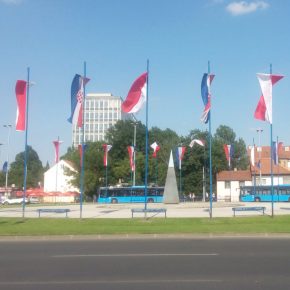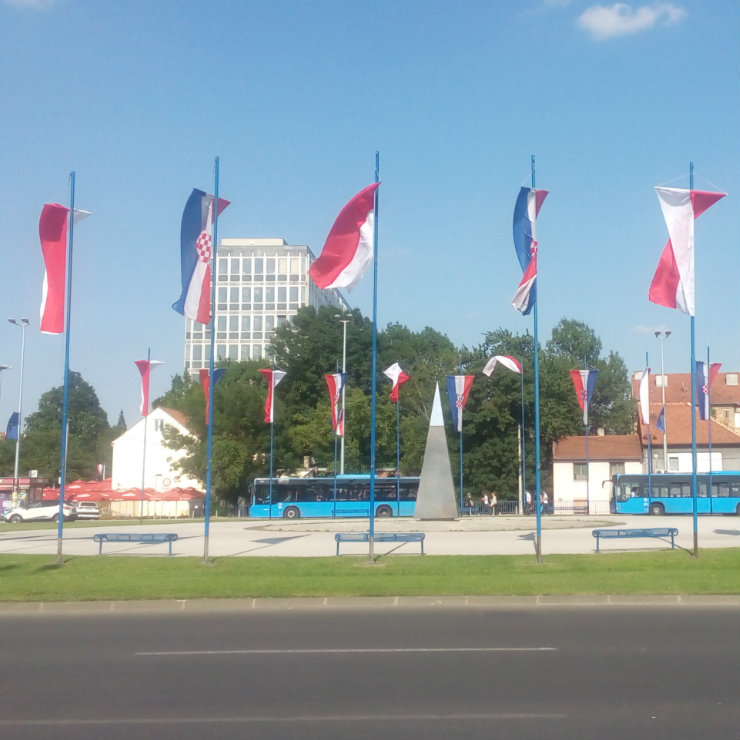Tydzień w gospodarce
Category: Trendy gospodarcze
Analyst, journalist specializing in the Western Balkans and Middle East domestic and foreign affairs

Zagreb, Croatia (Branko Radovanović, CC BY-SA)
The two countries are connected more than are aware of. Both Croats and Poles are part of the family of Slavic nations. In Poland and Croatia, the dominant Catholic faith is further accentuated by love for Pope John Paul II, a highly symbolic personality. In 19th century, within the Habsburg Monarchy there was a part of Poland, and in Zagreb we find traces of people connected with Poland. Take for example Adolf Mošinsky, the mayor of Zagreb from 1892 to 1904, when the Croatian National Theater was built, very similar to the Cracow’s Juliusz Slowacki theatre. Polish roots are also found in the biography of Slavoljub Penkala, the great Croatian innovator. Both countries are now part of the European Union and the NATO, and their political and economic relations are at the highest level in their history, which does not mean that there is no room for improvement. There is a will to strengthen economic cooperation, start cooperation within the Three Seas Initiative, and develop transport and energy links.
Polish-Croatian economic cooperation is at a fairly good level, but it seems that the real momentum is not there yet. Croatia’s accession to the European Union in 2013 was a powerful impulse, which led to the abolition of many obstacles to economic cooperation. In 2017, relations of two economies generated a turnover of over EUR1bn, while the annual export and import grow two-fold. Polish companies present in Croatia include transport and shipping company OT Logistics, the shoe brand CCC, clothing retail Reserved, glass manufactory Press glass, and many others. The largest Croatian investor in Poland is the Orbico Group. Poland and Croatia have perfect conditions for cooperation in the energy sector. The planned LNG terminal on Krk will become the southern point of the north-south energy corridor, and the modernization of the railways will allow taking a full advantage of the traffic corridor Baltic-Adriatic. Poland and Croatia are also interested in the Via Carpatia project, linking the Baltic States with the Central Europe and the Balkan Peninsula.
There are multiple initiatives in Croatia and Poland shares its experience in achieving the economic success. Still, Croatian entrepreneurs think about Poland as if it is the year 1990. Despite the fact that in 2007 Croatia had a higher GDP per capita than Poland, it has not achieved such a success as Poland did.
Polish economic success is not a coincidence. By the middle of last century, Poland has developed relatively well, but all at that time communist countries recorded a relatively high growth rates. Poles were perceived by Croats as poor people who, with the pain and the numerous bureaucratic complications, travelled to the seaside in the Polish Fiat 126, and the lucky ones by a slightly larger model 125. In reality, until the 1950s Poland was a more developed state than Croatia, relying on its own internal forces and relations with a strong German economy.
From the nineteenth century to 1950s, Poland was better developed than Croatia, as it is closer to important trade routes to the Baltic and an important exporter of raw materials, especially wood and cereals. Poles are also skilled traders (the small-business and craftsman’s spirit of small entrepreneurship did not leave them even in communism), so the country, much earlier than Croatia, not only because of the geographic proximity of German industrial centers, responded to the impulses of capitalist development which originate from the north and northwest of the continent. In a wider range of things and within the long historical cycles, it can be said that Poland recently returned to a historical place that it has already achieved in the first half of the 20th century. The developmental deviation Croats felt the most in the 1980s of the last century.
As early as the beginning of post-communism processes after 1990, the differences between Croatia and Poland were almost erased. In 1990, Croatia was 5 per cent more developed than Poland. However, the post-communism process in Croatia was particularly traumatic by the war, hyperinflation and the breakup of the market of the former Yugoslavia. Only three years later, in 1993, Croatia remains only 7 per cent of Poland’s developmental stage (according to the Maddison Project data – some sources provide different proportions). After getting rid of the hyperinflation in 1994, Croatia was starting to recover economically. Finally, the developmental overthrow occurred before the crisis in 2008. It means that Polish success in the post-2008 world crisis was not decisive. It is about a deeper and more permanent causes of Polish success through the economic policies and events that had enabled relatively rapid economic growth in Poland after 1990.
There is a thing that surely distinguishes Poland from Croatia – the desire for success through the cooperation with the Western countries. In Croatia, there is generally no discussion of developmental relations with other countries. Croats do not believe in the big change in these relationships. Stronger institutional indicators show that Poles have consistently improved the quality of institutions, both economically and politically. Today, there are many different ways of measuring the quality of institutions and all show that in all areas there are very good institutions in Poland that have developed parallel to market reforms. By contrast, Croatia a country with a serious institutional backlog. Given the generally accepted theory of the important role of institutions in economic development, the institutional differences explain Polish success and Croatian failure during and after the credit crunch.
Among economists, as well as in the wider public in Croatia, there is no overriding explanation of why the Croatian lag has happened. Different reasons are offered, but no one has yet tried to rank them objectively. The most frequently mentioned are the interpretations that derive from the war and the delay of Croatia’s EU accession. They are also a rather suspicious explanation about the over-estimated HRK and de-industrialization. In the last ten years there are more and more frequent interpretations that have played a decisive role in reforming: while Poland and other Central European countries have implemented tax reforms, administrative barriers, privatized state-owned companies and attracted foreign investors, the Croatians kept unreasonably high taxes, complicated bureaucratic processes and reaffirmed national-state capitalism, in which foreign investment is seen as occupation rather than integration from which everyone could benefit.
But there are other, non-economic aspects, such as culture and its norms, politics, wars, demographic trends, that should be taken into account. Croatia is heavily affected by Italy, while the impact of Poland and Slovakia is minimal. These aspects have played an important and crucial role in the economic development in the long run.
Vedran Obućina is an analyst and a journalist specializing in the Croatian and Middle East domestic and foreign affairs. He is the Secretary of the Society for Mediterranean Studies at the University of Rijeka and a Foreign Affairs Analyst at The Atlantic Post.



